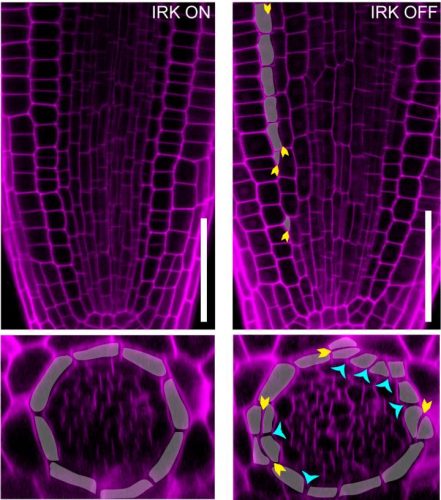Research identifies possible on/off switch for plant growth
- Like
- Digg
- Del
- Tumblr
- VKontakte
- Buffer
- Love This
- Odnoklassniki
- Meneame
- Blogger
- Amazon
- Yahoo Mail
- Gmail
- AOL
- Newsvine
- HackerNews
- Evernote
- MySpace
- Mail.ru
- Viadeo
- Line
- Comments
- Yummly
- SMS
- Viber
- Telegram
- Subscribe
- Skype
- Facebook Messenger
- Kakao
- LiveJournal
- Yammer
- Edgar
- Fintel
- Mix
- Instapaper
- Copy Link
Posted: 13 January 2020 | Sam Mehmet (New Food) | No comments yet
Lead researcher Jaimie Van Norman is hoping to understand whether bigger roots survive stress better, with some of the biggest challenges to crops including drought and high levels of salinity in soils.


New research from the University of California, Riverside has identified a protein that controls plant growth, which is said to be good news for an era in which crops can get crushed by climate change.
Researchers found the protein, IRK, while looking for clues to the ways plant cells divide or expand. They discovered IRK in the roots cells of a plant related to mustard.
“When this protein is present, the root perceives a signal that tells cells not to divide,” said Jaimie Van Norman, who led the study and is an assistant professor of plant sciences at UCR. “If we can get the plant to ignore those signals, we may be able to get it to grow in conditions where it might not otherwise.”
The research is said to demonstrate that turning off the gene producing IRK causes an increase in the number of times the plant’s root cells divide. Additional cells can lead to bigger roots, and perhaps to plants that are better at taking up nutrients from the soil and grow larger.


These are Arabidopsis root tip cells stained with a red dye. Image shows increased cell division when IRK is inhibited. Credit: Jaimie Van Norman / UCR
There may be some instances in which farmers also want to limit plant growth, the researchers explained. For example, keeping weeds small, or trying to pause crop growth until a severe storm passes.
“This discovery gives us another way to control growth,” Van Norman said. “Understanding how the plant itself stops growth can also allow us to accelerate growth.”
So far, Van Norman’s team has only tested the effects of turning off the IRK gene in Arabidopsis, the mustard relative. However, Van Norman said the IRK protein is also found in other crop plants.
This research is said to be notable not only for its potential impact on crop and food security, but also because roots have historically been less well studied than the above-ground parts of plants. This is likely due to the relatively inaccessible nature of roots, Van Norman said.
Previous research has examined the role of signals sent between cells up and down the plant from the roots up toward the shoots, but this study is said to show communication between cells across the root is important as well.
“There was a longstanding hypothesis that this type of horizontal communication between cells was important, and this work provides new evidence that it is,” Van Norman said.
“It may be the case that by understanding what happens when the IRK-producing gene is turned off, we can make root growth less sensitive to soil conditions that pose a threat to food security.”
Related topics
Research & development, Supply chain, Technology & Innovation








